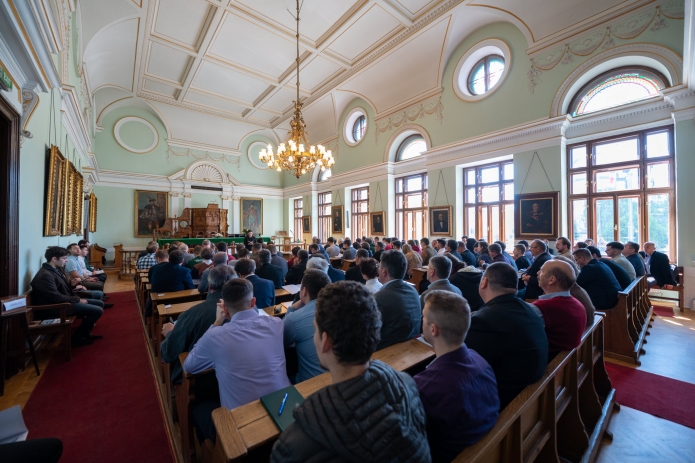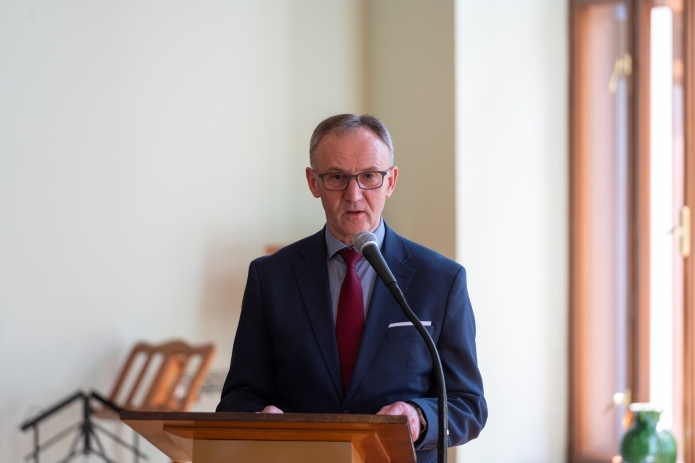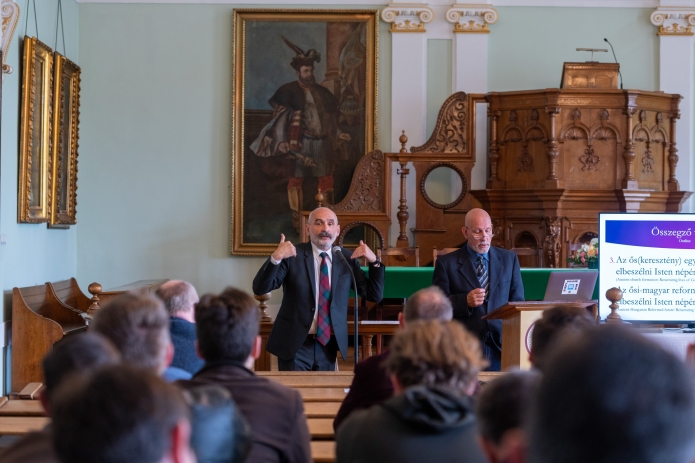The Ravasz László Research Centre for Practical Theological held its annual conference on 11-12 May 2023. The first day focused mainly on pastoral theological issues, and the starting point was an up-to-date definition of the pastoral office. The second day of the conference focused on missiological issues.
A Report on the annual conference of the Ravasz László Research Center in Practical Theology



The Ravasz László Centre for Practical Theological Research held its annual conference on 11-12 May 2023. Jenő Kiss, theological professor and director of the centre, said in his opening speech that the aim of the conference was to find answers to the question of how a church minister can live and manifest his / her commitment to God and his / her devotion to people.
The first day focused mainly on pastoral theological issues, and the starting point was an up-to-date definition of the pastoral office.
Stefan Tobler, professor of theology from Sibiu (Hermannstadt), argued for a more flexible understanding of the office, so that new forms of ministry can also dress up the character of an office. One of his striking phrases was: "We must seek not only to fill structures with life, but also to seek the structure for the life that is emerging."
Congregational minister and theology teacher, József Székely emphasized that the person of a pastor is of great importance in ministry when expressed in a reflective way. This conveys pastoral ministry a sense of personal closeness.
Márton Járay, lecturer at Semmelweis Medical University in Budapest, pointed out that loneliness is a serious challenge and danger for pastors, against which the (small) community can protect him or her.
Theology teacher Béla-Botond Jakabházi discussed the links between the ministers' metal health and ministry, and stressed the responsibility of the church in paying attention to these issues.
Eszter Nagy, an MA student of the PTI, outlined the role of attachment patterns, highlighting the importance of secure attachment, which enables a minister in trouble to seek help in difficult times.
The panel discussion was introduced by theology professor Jenő Kiss, who pointed out that in the pastor's ministry there must be a balance between the ministry, the vocation and the personal expression of the person.
The discussion was joined by Miklós Kocsev, professor of theology at the Károli Gáspár Reformed University of Budapest, youth minister Árpád Sógor, youth president István Telegdi and graduate student Dániel Gecse Krisztián, but also by many of the participants. From the discussion it emerged that the theological students value the mentoring process offered during their training and the fellowship between students and teachers in shaping their spiritual lives.
The central questions of the second day of the conference were missiological. In the postmodern age, the four existential dilemmas of Pascal have become relevant again: we all seek happiness, we all find ourselves unhappy, we all seek truth and what we all find is injustice, falsehood and error.
In search of modern 'Socratic Theological' and pastoral responses to these topics, Michael Goheen (Vancouver) and Alistair Wilson (Edinburgh) gave thought-provoking introductions. The presentations developed directly around missiological themes. In contrast to the universal claims of postmodernity, both speakers started modestly from their own contexts. But they formulated their questions not only from a Western approach, but rather searching for relevant answers in an East European context. The tone of the questions posed to the speakers was a credible testimony to this.
The second day of the conference focused on the mission of the church, especially in the context of the challenges of the postmodern age, trying to understand the mission of congregations and the role of ministers in shaping this mission. The theme was introduced by two presentations of the Canadian missiologist, Professor Michael Goheen. In his presentation he made it clear that we find ourselves at the crossroads of two "great stories", the story of biblical humanism and the story of postmodern humanism. In this, we understand the challenges of globalism, but we do not give in to it in a subservient way, we rather bear witness to the biblical story.
Michael Goheen is a world-renowned authority in contemporary interdisciplinary theological discourse. In his second lecture he dreamt with us of an "ancient Hungarian future" in the context of a minority Transylvanian church. With this noble attempt, he also presented a so-called "incarnational model" of mission with a Reformed theological emphasis, which undoubtedly had a gestural value. The great interest in the professor's work was also shown by the fact that two of his books published in Hungarian were sold out the conference (80 copies).
Michael Goheen was followed by a talk by Alistair Wilson, Professor of New Testament and Missiology at Edinburgh, who presented a possible missiological and partly ecclesiological reading of the Gospel of Luke. The emphases of his lecture brought the topic into the mainstream of the previous lectures, showing us the arc of God's great story against the background of the gospel narrative and trying to emphasise: what kind of mission strategy does this suggest for our congregations? Few people know this, but the credibility of what he had to say is enhanced by the fact that he was not only engaged in this issue at the academic level, but also spent 9 years as an active missionary in South Africa, preparing local pastors for mission and church planting ministry as a teacher at the Dumisan Theology School there.
The afternoon sessions were opened by the theology teacher Jenő Kiss. The main theme was the reconstitution of the different sections of the Ravasz László Research Center.
Afterwards, the participants listened to and discussed the keynote presentation jointly written by Róbert Lukács and Krisztián Dániel Gecse, MA second year theology students.
The newly formed workshops have started their work. They aim to bring together ministers to work in small professional groups. They will share the results of their work with their fellows.
About 60 ministers attended the conference, but theology students were also present. Pastors already in ministry and students preparing for ministry practised fellowship together in morning devotions and reflected together on the issues mentioned above. The presentations inspired many helpful reflections and fruitful discussions. The participants considered the time spent together to be fruitful.
Jenő Kiss and Levente Horváth